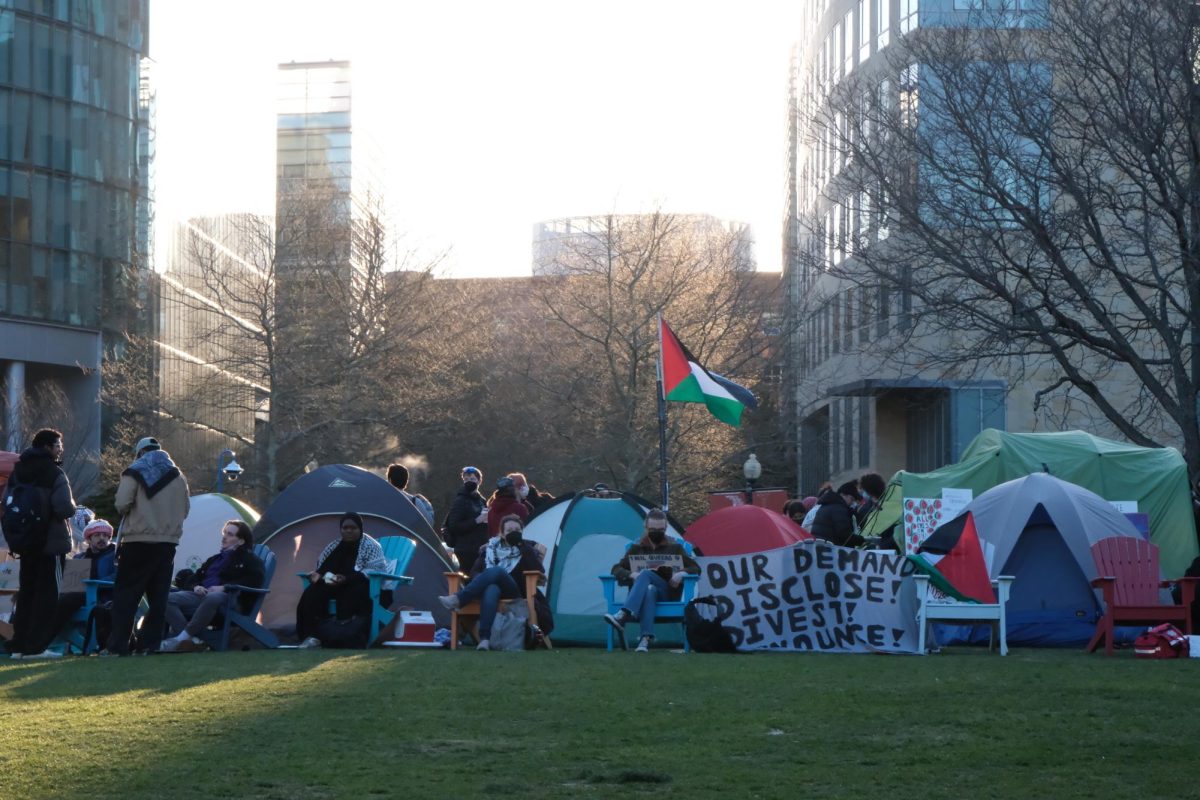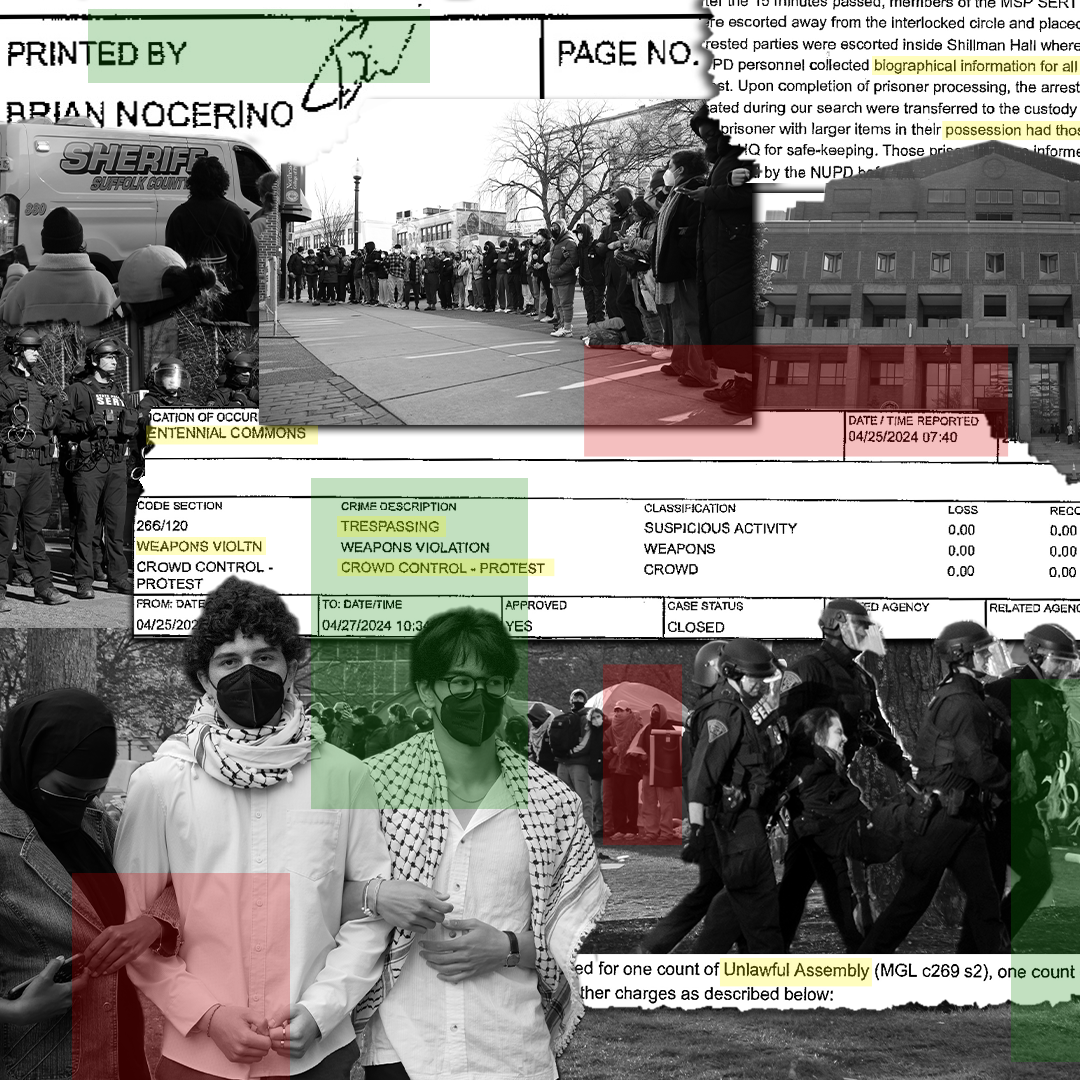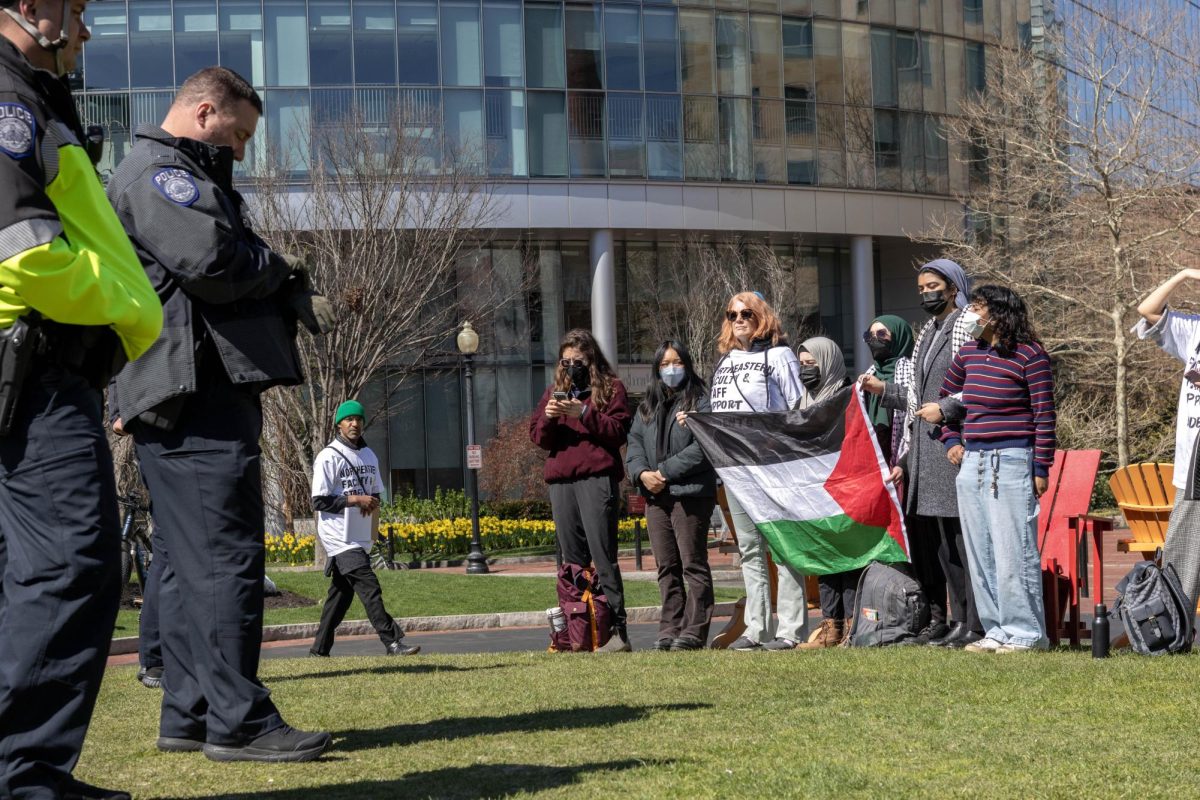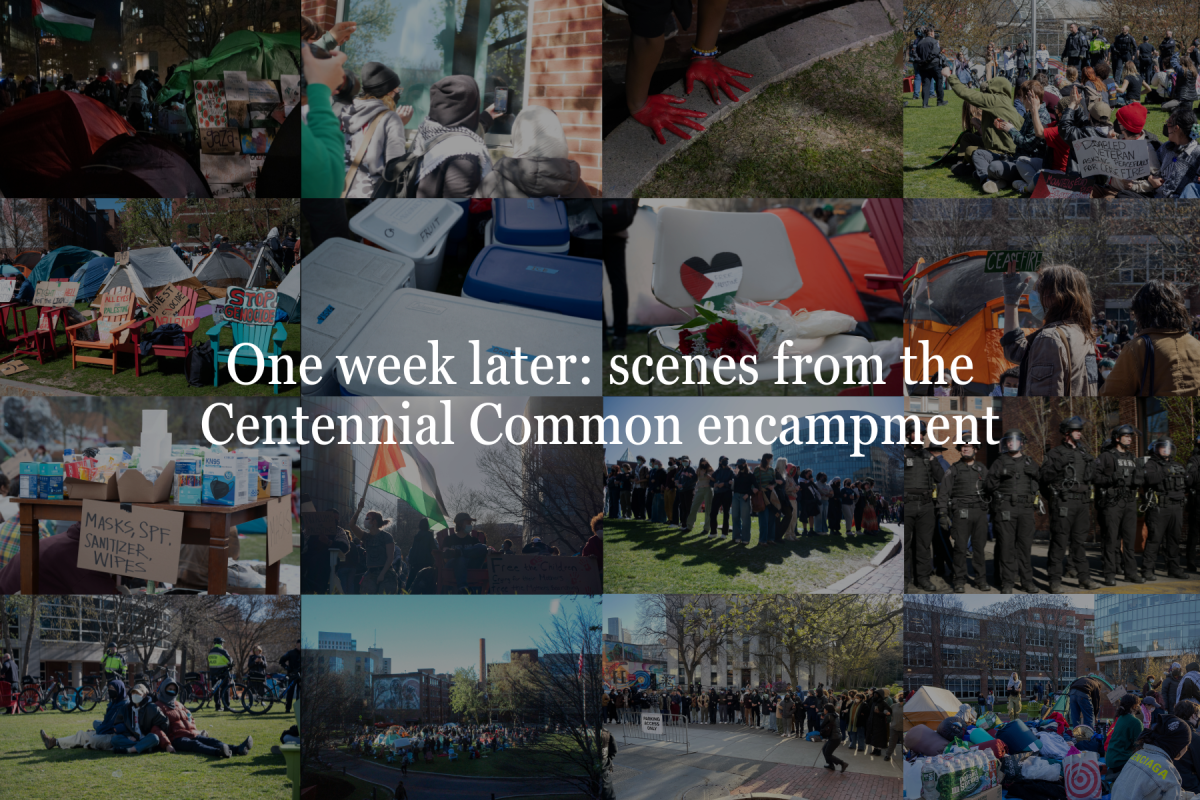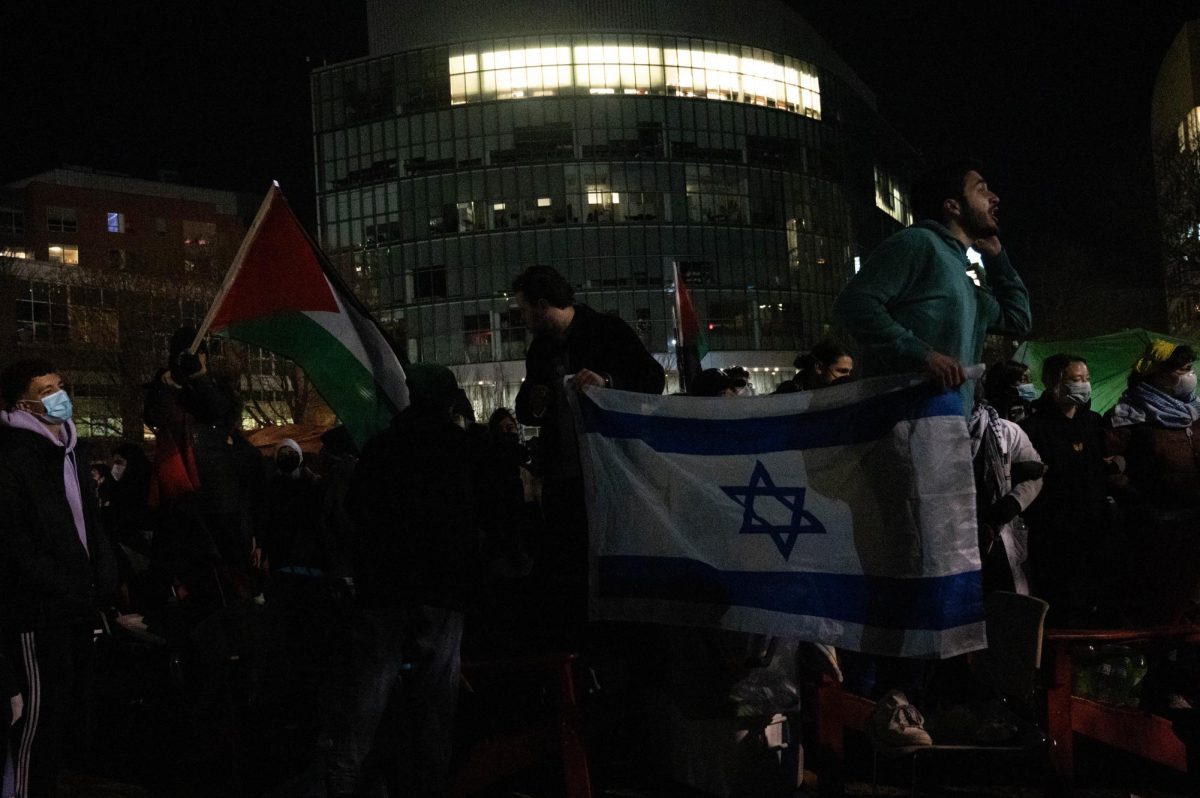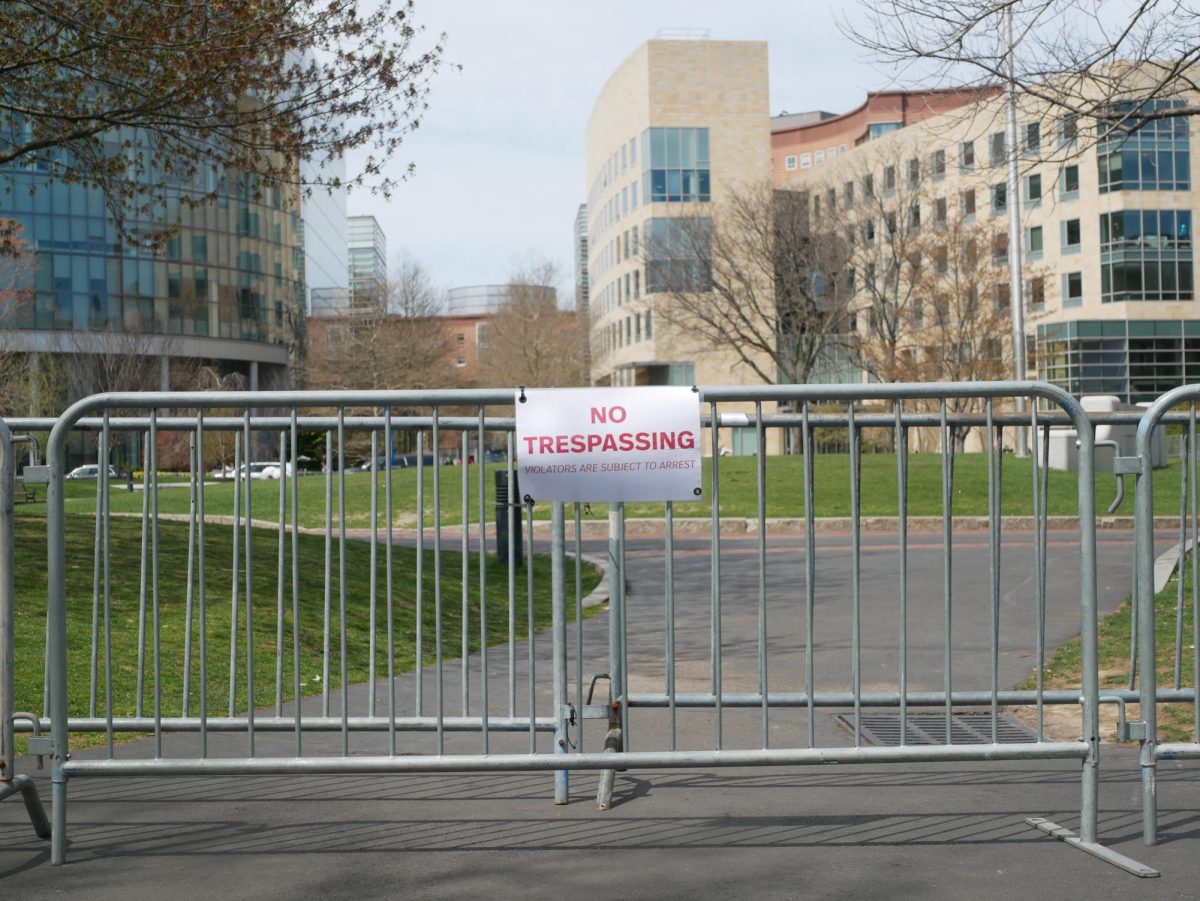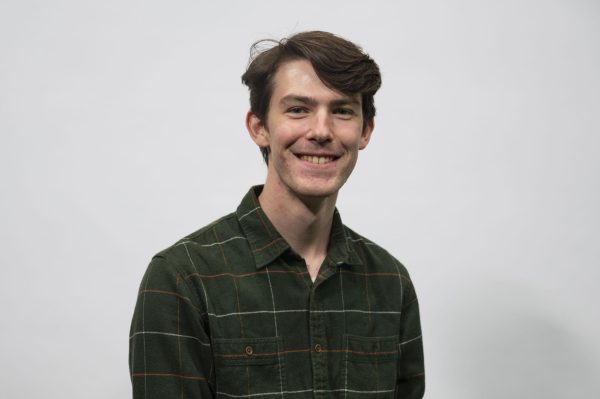Just a few steps away from Centennial Common, where pro-Palestine protesters set up an encampment for nearly 48 hours in April, sits the John D. O’Bryant African American Institute. Affectionately called “The ‘Tute” by many students, the building is home to Northeastern’s Black student organizations, events and ideals that, some say, closely align with those of students advocating for Gaza.
Starting April 25, hundreds of student protesters and community members filled Centennial Common to join a pro-Palestine encampment, adding Northeastern to the plethora of universities across the nation whose students and affiliates are demonstrating against what they view as their school’s involvement in the escalating violence in the Gaza Strip. The protesting is fueled by calls for the divestment of university funds from companies involved with Israel and its military.
For the hours that the encampment stood, people of many ethnicities, races and backgrounds joined students in their cause to make for a diverse crowd and sense of community that some protesters said isn’t present in other spaces at the school. But Black students who participated in the encampment said the calls for justice hit especially close to home.
One student, who was granted anonymity due to fear of social retaliation, said it was a trip to The ‘Tute that drew him to the chants for a ceasefire.
The student, a rising second-year mechanical engineering major, felt the decision to stop by the encampment wasn’t a matter of knowledge, but instinct. Despite his academic focus on STEM, he cited his education on movements advocating for social progress as the most influential in his decision to join the protesters.
“I felt a sense of guilt. Here I am walking past the opportunity to do the things [I’ve learned about],” he said.
After first joining, the reasons to stay — despite the risk of arrest or disciplinary action from the school — compiled quickly, the rising second-year student said. The sense of community he felt led him to stay for over three hours.
Another student, a recent 2024 alum with a degree in environmental engineering who was granted anonymity due to fear of retaliation from the New York institution they are attending for graduate school, echoed the sentiment of connection and community she felt at the encampment — which many find difficult as Black students in predominantly white spaces — that made her stay. Amongst the Black students present at the demonstration, there were no clear patterns apart from a shared desire for social justice, with students representing all majors, organizations and cultures linked arm in arm, the alum said.
“I feel like I meet so many people [at protests]. You both know that you’re there for social impact. People are going because they actually care about the cause,” the alum said.
The development of these forged communities, she believes, is important to the vitality of any social justice movement, with personal relationships being the reason local initiatives become worldwide stories.
The only discernible trend they saw amongst the Black protesters, the two protesters said, was an intimate past with justice movements, with some of the most major protests in American history happening as close as their front doorstep.
The rising second-year student, who lived in Washington, D.C. for the majority of his life, recalls laying awake by his bedroom window as calls for gun control echoed throughout the city in the wake of the 2018 Parkland school shooting.
“I remember watching the ‘March for Our Lives’ and thinking, ‘I don’t wanna look back and say I just watched because of the risk,’” he said.
Personal connections to ideas for change stand at the core of the Black student experiences at Northeastern, both students said. The rising second-year student noted that outside of times of heightened polarization, a significant portion of his conversations with peers were already colored by race, discrimination and what college students could contribute.
“No African American goes to college without changing some portion of their world … these are the issues we came to college to change,” he said.
Rashida Jalloh, co-president of the Northeastern Black Student Association, said active participation in any form of advocacy is one that resonates with the purpose of the student organization as a whole.
“Our organization believes all the Black students and students in general on campus should have the right to exercise their beliefs safely and correctly,” she said.
Beyond the general desire to contribute to the movement, Black students who participated in the encampment spoke about a respect for the Palestinian people that they believe is mutual. The evidence of this symbiosis between people isn’t hypothetical, the alum said, but rather found in the history of the Black Lives Matter movement and others just like it.
“When it was [tanks] rolling through Ferguson during [a Black Lives Matter] protest, it was Palestinians over there telling us how to deal with tear gas over here. How is standing up for Palestine not also standing up for myself? Our struggles are interconnected,” the alum said.
The rising second-year also mentioned that the politic of solidarity is upheld throughout the diaspora, wherever people are paying the price of colonialism.
“A similar thing is happening where I’m from — Cameroon,” the rising second-year student said, “[There is] media suppression, mass violence, oppressor and the oppressed.”
The rising second-year student also said that solidarity extends beyond the empathy of linked struggle. Many groups on campus — South Asian, Latin American, white American, Jewish, Muslim — were present together at the demonstration despite what he believes traditional media conveys.
Another student, a rising third-year, who requested anonymity due to personal privacy concerns, was one of the 98 people arrested April 27. He said what he called the “extreme measures” taken by the various police departments that were present were coded by the abuse Black people often face.
The alum, after witnessing dozens of her peers in handcuffs, said she wasn’t shocked by the lengths the police went, a stance entrenched in her belief that Northeastern has always been “violent” — just in more covert ways.
“You see this with everything [at Northeastern]. Northeastern has been complicit in genocide. They were complicit in Apartheid. They gentrify Roxbury. There’s blood on their hands,” she said.
Despite this, the students said they remain reassured in the might of their community and the potential for dreams to become reality against insurmountable odds.
“Look in the eyes of fear and tyranny and say you do not scare me,” the rising second-year student said. “Black students stand with Palestine. If not all, the vast majority. It’s the Black Muslims, Black Christians, African Americans, Black Americans, all of us.”


